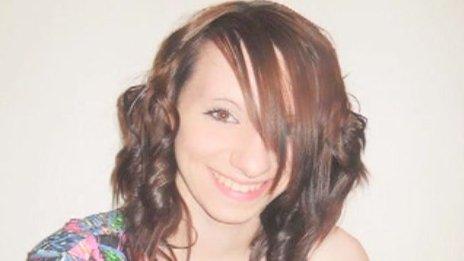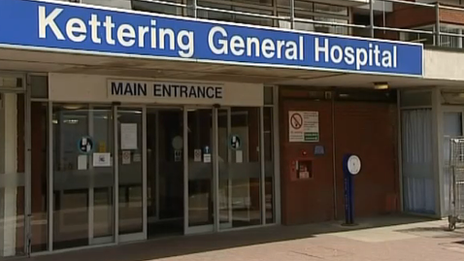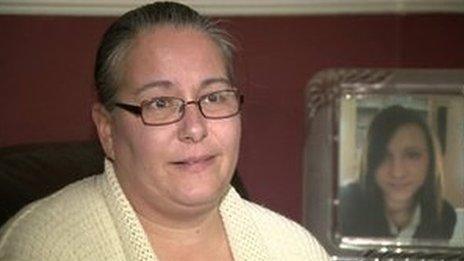Kettering Hospital reveals Victoria Harrison death errors
- Published

Victoria Harrison, who was found unresponsive the morning after routine surgery
A hospital where a girl bled to death has revealed a catalogue of errors, weeks after withholding details for fear of "putting staff under more stress".
Victoria Harrison, 17, was found dead the day after an appendix operation at Kettering General Hospital in 2012.
An inquiry uncovered 43 errors, but bosses refused to release full details.
The BBC has now learned routine observations were discontinued and nurses' conduct was unprofessional.
'Stress and pressure'
Miss Harrison's mother, Tracy Foskett, who had seen the report, said all hospitals should publish details of their mistakes.
"I asked the hospital 'did my daughter die as a result of the NHS not providing funding?', and I was told 'no, it was human error'," she said.
"So let the public know what that was - there needs to be more transparency."
The findings of the hospital's serious incident investigation were not published over claims that it would put staff under "additional stress and pressure in addition to that already experienced during the investigation and inquest".
The BBC challenged the refusal under the Freedom of Information Act, with an internal panel agreeing that revealing the mistakes, oversights, errors and recommendations were "in the public interest".
The report - with names redacted - also reveals 10 members of staff were disciplined.
Among the 43 mistakes, oversights and errors were:
The wrong surgeon being named on hospital documentation
Inconsistency in respiratory rate recordings
Uncertainty of blood loss
Inconsistency in handovers between nursing teams
Inaccurate recording of medical administration
No formal pain assessment
Problems with overnight monitoring
Vital signs not monitored after painkillers
Lack of piped oxygen in bed spaces three and four
Consultant not told of bleed
Member of staff did not check Miss Harrison's abdomen
Inaccurate recording of attempted resuscitation
No record of discussions with the family

The hospital had previously said it had "a right to withhold the information"

Victoria Harrison's family was given the full report ahead of an inquest into her death

She had texted her boyfriend from her hospital bed to say she was bleeding
The teenager, from Irthlingborough, was given an emergency referral by her GP on 14 August 2012, when she appeared to be suffering from appendicitis.
An artery was damaged during surgery, with the surgeon rectifying the issue.
But Miss Harrison texted her boyfriend from her hospital bed to say she was in pain and bleeding later that day.
Not all nursing staff were aware of the bleed and some did not routinely read medical notes and could not always decipher surgeons' handwriting, an inquest in December heard.
Her last written formal observations were taken at 20:15 BST on 15 August, nine hours before she was found unresponsive by nursing staff.
Coroner Ann Pember criticised the hospital over missed opportunities and said, had these been acted upon, "the outcome may have been very different".
"I believe her chances of survival would have significantly increased," she said.
Peter Walsh, from the patient safety charity Action against Medical Accidents (AvMA), said the hospital's original decision to "suppress" the report "did not help public confidence".
"The trust's original decision to withhold the report was wrong in so many ways," he said.
"It runs against the spirit of openness and transparency when things go wrong, the need for which was made so apparent by the Mid Staffordshire scandal.
"How could the public and bodies responsible for monitoring the trust know whether lessons really had been learnt and acted upon?"

Tracy Foskett set up a Facebook group to test public opinion
Katherine Murphy, chief executive of the Patients Association, said: "It is vitally important that trusts disclose information about things that have gone wrong so that we can learn from mistakes.
"The tragic death of 17-year-old Victoria Harrison is a clear example of lack of communication between staff leading to a catalogue of errors and unacceptable care.
"It is essential that lessons are learnt and practices modified so that there is no repeat of such cases.
"It is the relatives who have to live with the consequences and the sad loss of a young life that could have been avoided."
'Vibrant young girl'
Following the hospital's initial refusal to release its report, Ms Foskett set up a Facebook page, external to gauge public opinion and said she was amazed at the support she received.
"I know the hospital has put changes in place, but the public needs to be aware of what those are," she said.
"These changes have come about because of the death of my daughter, a vibrant young girl. They should have already been in place."
Victoria Harrison died the day after a surgery on her appendix
In January, the hospital's chief executive, Fiona Wise, said: "We have a right to withhold that information... where we feel it is appropriate to prevent further damage to individuals who have already been through a thorough investigation process."
It has set up a programme of improvement measures and, as a result of the BBC's request, has disclosed its detailed action plan relating to each of the 43 errors.
These include:
Clear and accurate record of blood loss to be recorded in every procedure on theatre record
Clear documentation of patient condition to be recorded on return from theatre to reflect all incidents, treatment and post-operative instructions
Ward standard to be developed for monitoring of patients at night
Senior staff to conduct spot checks on patient care and to challenge nursing documentation
Team-building days for staff
- Published21 January 2014
- Published11 December 2013
- Published10 December 2013
- Published9 December 2013
- Published30 October 2013